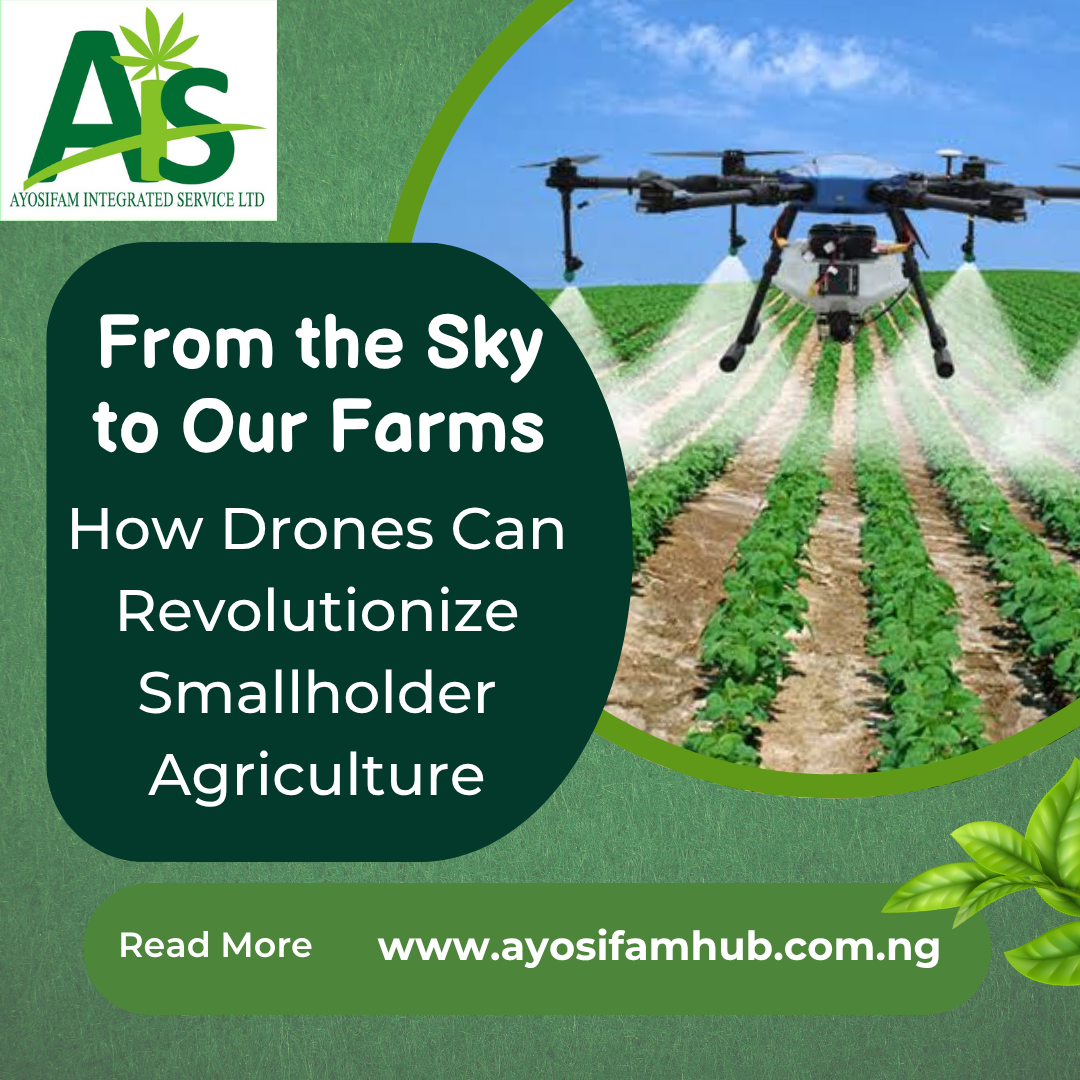Hey AyosifamHub family!
We often discuss innovation as the key to unlocking the full potential of Nigerian agriculture, particularly for our hardworking smallholder farmers. While advancements in seed varieties and improved irrigation are crucial, a game-changer is on the horizon that could transform how we manage our farms: the widespread adoption of drones for spraying herbicides, fertilizers, and insecticides.
Imagine this: no more back-breaking manual spraying, no more uneven application, and significantly reduced exposure to harmful chemicals. Drones offer a future where farming is not only more efficient but also safer and more accessible to a broader range of individuals.
The Drone Advantage: Why Smallholders Need This Technology
The benefits of drone spraying for smallholder farmers are truly compelling:
- Precision and Efficiency: Traditional spraying methods often lead to wastage and uneven coverage. Drones, equipped with GPS and intelligent mapping software, can precisely target specific areas of a field. This means applying the right amount of chemicals or fertilizers exactly where needed, reducing waste by up to 30% and optimizing nutrient absorption. This precision translates directly into higher yields and better crop quality.
- Reduced Labour and Time: Manual spraying is incredibly labour-intensive and time-consuming. Drones can cover vast areas in a fraction of the time, freeing up valuable human resources for other critical farm tasks. A single drone can treat several hectares in an hour, a feat that would take a team of laborers days to achieve. This speed is particularly vital for timely intervention against pests or diseases, preventing widespread crop loss.
- Improved Safety and Health: Exposure to agricultural chemicals poses significant health risks to farmers. Drones eliminate the need for direct human contact with these substances, drastically reducing the risk of chemical poisoning and related illnesses. This is a massive step towards ensuring the well-being of our farming communities.
- Accessibility to Difficult Terrain: Many smallholder farms are located in areas with uneven terrain, steep slopes, or muddy conditions that are challenging, if not impossible, for traditional ground equipment to navigate. Drones fly above these obstacles, ensuring every part of the farm receives necessary treatments.
- Environmental Sustainability: By minimizing chemical overuse and runoff, drone spraying contributes to a healthier environment. Less chemical seepage into the soil and water bodies means a more sustainable farming ecosystem for generations to come. Drones also use significantly less water compared to conventional sprayers, sometimes up to 95% less, a critical factor in a world grappling with water scarcity.
A Special Plus for Potato and Cassava Farmers!
For our potato and cassava farmers, drone technology offers particularly exciting advantages:
- Targeted Weed Control for Cassava: Cassava fields are often plagued by stubborn weeds that compete for nutrients. Drones can deliver herbicides with pinpoint accuracy, minimizing damage to the cassava plants themselves while effectively suppressing weeds. This is crucial for maximizing cassava yield, as effective weed control can significantly impact the final harvest.
- Disease and Pest Management for Potatoes: Potatoes are susceptible to various diseases and pests that can spread rapidly. Drones can quickly survey large potato fields, identify early signs of infestation or disease, and then apply fungicides or insecticides precisely where needed. This rapid, targeted intervention can save entire crops and reduce the reliance on broadcast spraying, which can be less effective and more costly. The ability to spray difficult-to-access areas within dense potato foliage is a major win.
Making Drone Technology a Reality for Smallholders: An Accessible and Profitable Venture
While the advantages are clear, we acknowledge the hurdles. The initial perception might be that agricultural drones are an expensive, high-tech luxury beyond the reach of most smallholders. However, this is where a critical look at the venture reveals its true potential: starting a drone spraying service doesn’t necessarily require heavy capital, and with the immense demand, it’s a highly profitable venture.
Consider these points:
- Affordable Entry Points: While large, sophisticated drones for massive commercial farms can be costly, entry-level agricultural spraying drones suitable for small to medium-sized farms are becoming increasingly affordable. You don’t need a multi-drone fleet to begin. A single, reliable drone, along with essential accessories like extra batteries and charging equipment, can be a solid starting point.
- Focus on Service, Not Ownership: The key for smallholder farmers is not necessarily to own a drone, but to access drone services. This creates a fantastic business opportunity for agri-entrepreneurs. You can start a drone spraying service that caters specifically to smallholder farms in your community. Farmers pay a fee per hectare, making the technology accessible to them without the burden of ownership and maintenance.
- High Demand and Ready Market: The challenges faced by smallholder farmers (labor shortages, health risks from manual spraying, desire for higher yields) create a huge, unmet demand for efficient and safe spraying solutions. Surveys in Nigeria have shown that a vast majority of farmers (over 90%) are willing to pay for drone services, and prefer drone application for agrochemicals over conventional methods. This indicates a robust and available market.
- Quick Return on Investment: With the operational efficiencies, reduced chemical waste, and potential for increased yields that drone spraying offers, farmers will see tangible benefits, making them repeat customers. For the service provider, the relatively low initial investment coupled with a high demand translates to a profitable business with a strong return on investment. The cost per acre for drone applications for custom operators can be as low as $7.39, while the value added to the farmer’s yield can be significantly higher.
- Scalability: A drone spraying venture can start small and scale up as demand grows. As your business establishes a reputation and generates revenue, you can invest in more drones, expand your service area, and even offer additional drone-based agricultural services like crop health monitoring and field mapping.
We’ve seen promising results in other African countries like Uganda, Kenya, Ghana, and Tanzania, where drone technology has led to increased yields, reduced input costs, and more efficient farming practices. Farmers like Opeyemi from Agriwas Farm in Oyo State, Nigeria, have already experienced the revolution first-hand. These success stories should inspire us to explore similar initiatives here in Nigeria, recognizing that this is not just about technology, but about creating accessible, profitable, and sustainable ventures.
At AyosifamHub, we believe in a future where technology empowers every farmer, regardless of the size of their land. Drone spraying is not just a fancy gadget; it’s a vital tool that can usher in an era of increased productivity, profitability, and improved livelihoods for our smallholder farmers, and a viable business opportunity for aspiring agri-entrepreneurs.
What are your thoughts on this? How do you think we can best integrate drone technology into our local farming practices? Share your insights in the comments below!
Stay innovative,
The AyosifamHub Team




